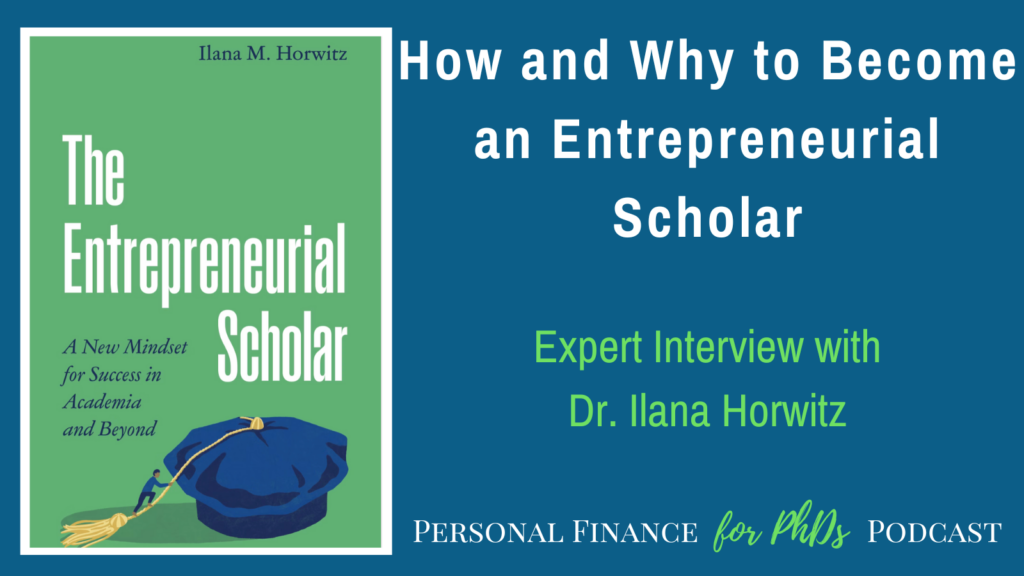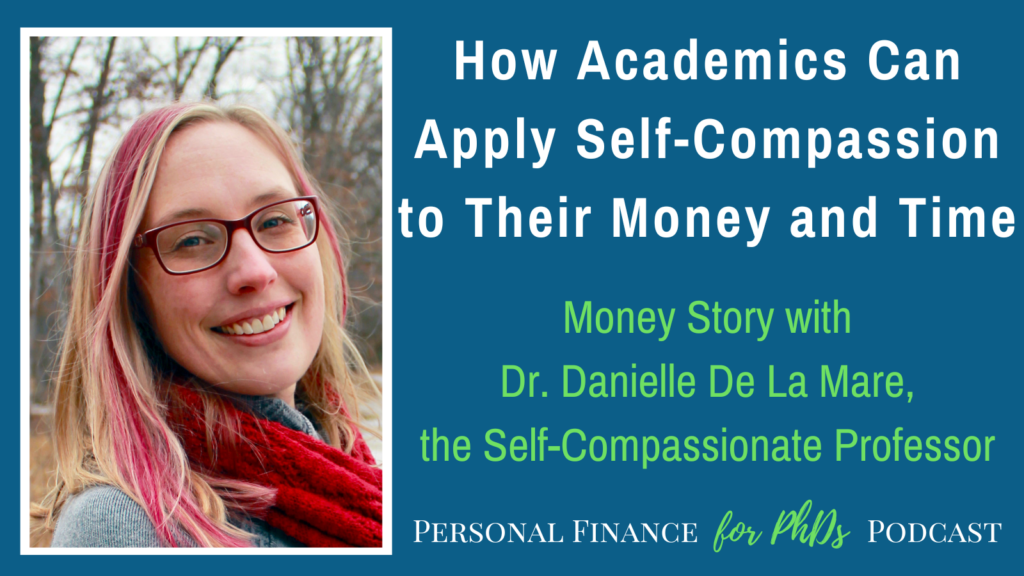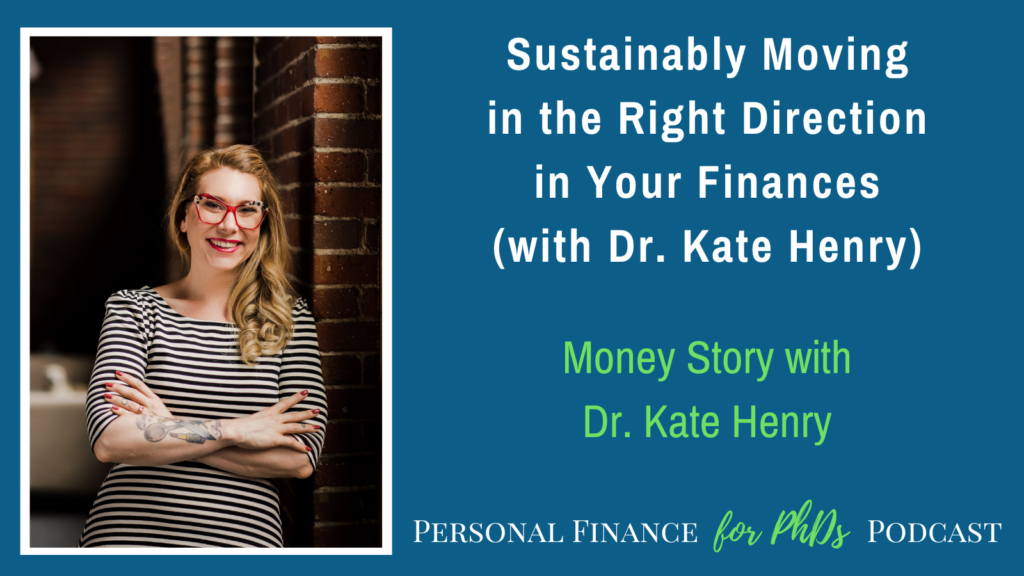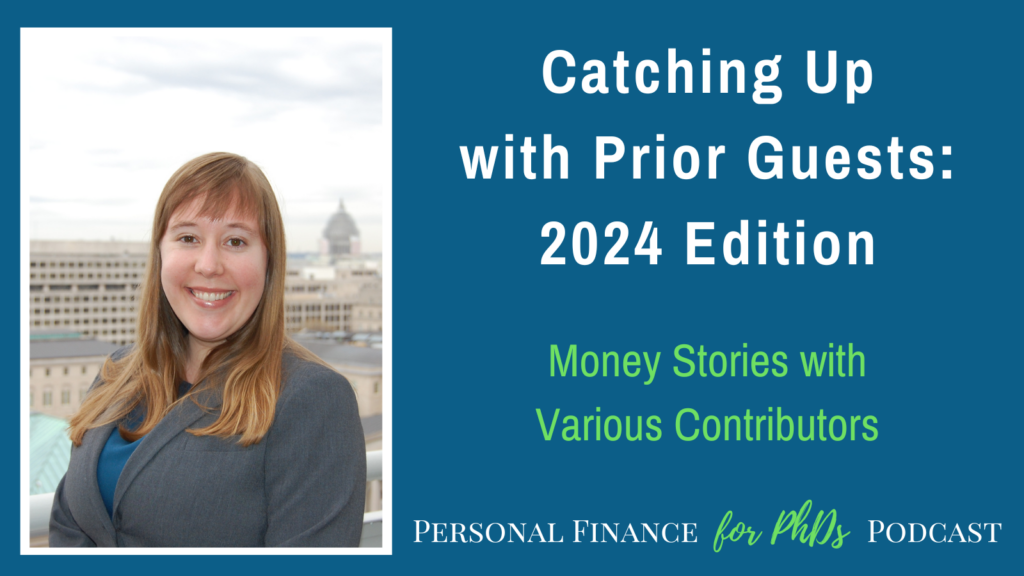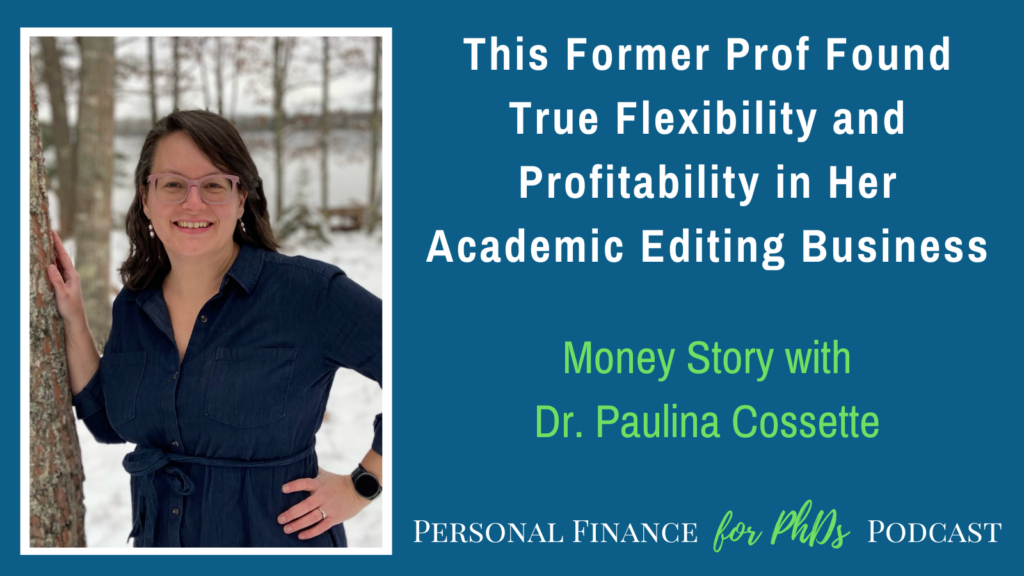In this episode, Emily shares her thoughts on whether PhDs are in a financial emergency. It’s possible that you are facing a financial emergency because you’ve been laid off or your grants have been terminated or interrupted or there’s some risk of that happening in the future. In this episode, Emily explores 1) what she learned from attending the National Postdoctoral Association’s Annual Conference in March, 2) what steps she recommends that you take in your personal finances and your career if you are in a financial emergency, and 3) what she’s giving away this spring to help you in this turbulent time.
Links mentioned in the Episode
- PF for PhDs Tax Workshops
- Op-Ed by Tom Kimbis: Federal research instability risks postdoc careers, American leadership
- National Postdoctoral Association Survey Results: Impact on Postdocs from Executive Branch Actions
- PF for PhDs Tax Center for PhDs-in-Training
- PF for PhDs Spring 2025 Giveaway
- Emily’s E-mail Address
- PF for PhDs AMA with Sam Hogan on the PhD Home-Buying Process
- PF for PhDs Book Giveaway for The Entrepreneurial Scholar by Ilana Horwitz
- PF for PhDs Subscribe to Mailing List
- PF for PhDs Podcast Hub
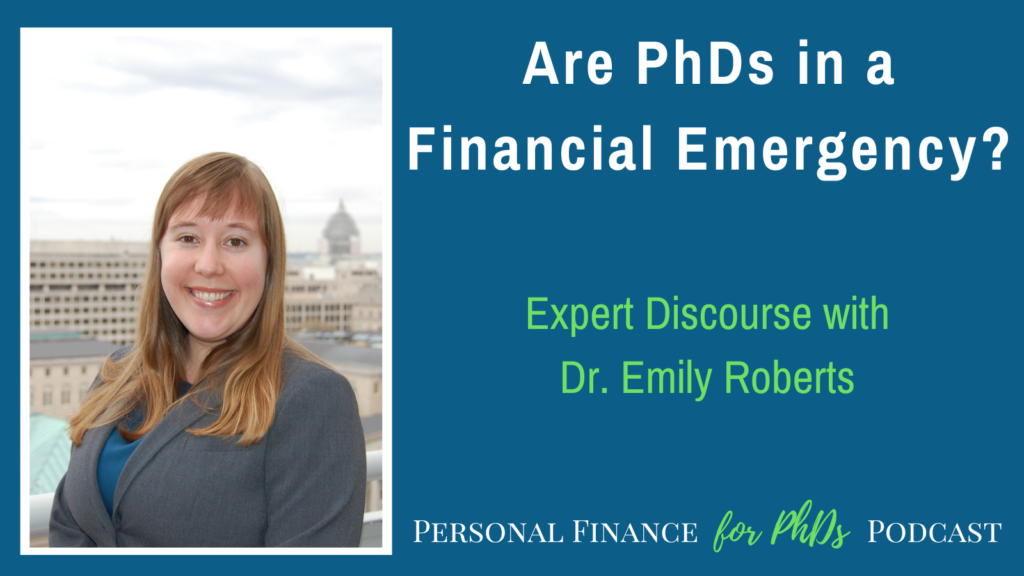
Introduction
Welcome to the Personal Finance for PhDs Podcast: A Higher Education in Personal Finance. This podcast is for PhDs and PhDs-to-be who want to explore the hidden curriculum of finances to learn the best practices for money management, career advancement, and advocacy for yourself and others. I’m your host, Dr. Emily Roberts, a financial educator specializing in early-career PhDs and founder of Personal Finance for PhDs.
This is Season 20, Episode 7, and today you’re getting my thoughts on whether PhDs are in a financial emergency. It’s possible that you are facing a financial emergency because you’ve been laid off or your grants have been terminated or interrupted or there’s some risk of that happening in the future. In this episode, I’m going to share with you 1) what I learned from attending the National Postdoctoral Association’s Annual Conference in March, 2) what steps I recommend that you take in your personal finances and your career if you are in a financial emergency, and 3) what I’m giving away this spring to help you as best I can.
The tax year 2024 version of my tax return preparation workshop, How to Complete Your PhD Trainee Tax Return (and Understand It, Too!), is now available! This pre-recorded educational workshop explains how to identify, calculate, and report your higher education-related income and expenses on your federal tax return. Whether you are a graduate student, postdoc, or postbac, domestic or international, there is a version of this workshop designed just for you. I do license these workshops to universities, but in the case that yours declines your request for sponsorship, you can purchase the appropriate version as an individual. Go to PFforPhDs.com/taxreturnworkshop/ to read more details and purchase the workshop. You can find the show notes for this episode at PFforPhDs.com/s20e7/. Without further ado, here’s my episode on whether PhDs are in a financial emergency.
I attended the National Postdoctoral Association Annual Conference in March, and it was quite valuable for me to get to speak with postdocs and postdoc office personnel about what’s happening on their university campuses and with their jobs. Everything has been so chaotic this spring in terms of the actions of the new administration and the responses from the judicial and legislative branches, it’s really hard to keep up with. Thankfully, some of the presenters pivoted their planned sessions to address what’s been happening and academia’s response, and the conference helped me to clarify a few of my thoughts, which I’ll share with you in this episode. Part 1 is what I took away from the NPA conference. Part 2 is what you can do in your personal finances to best weather the present storm, and I’m going to include specific advice for different stages of PhD training and employment. Part 3 is what I’m giving to you over the next couple of months and why and how you can access everything.
Part 1: My Take-Aways from the National Postdoctoral Association Annual Conference
This was my first time attending NPA, and I attended as a sponsor, and I thought it was a wonderful conference. I attend conferences both for networking with potential clients and my own professional development, and in this case the timing was really good for me to get a sense of how universities are responding to the funding cuts and so forth. Because this conference was focused on postdocs, I didn’t hear much specifically about graduate education, but I’m sure I will learn more when I attend other similar conferences later this year. At this conference, I especially appreciated the talks from Tom Kibis from the NPA and Nicholas Dirks from the New York Academy of Sciences, the session co-led by Meagan Heirwegh from Caltech, Sofie Kleppner from Stanford, Julia Parrish from the University of Washington, and Zoe Fonseca-Kelly from Harvard, and my conversation with Alberto Roca of Diverse Scholar, as they most directly addressed the current situation.
My overall take-away from the conference is that everyone is bracing for a tough time economically. The tough time has already started but will get worse in the next fiscal year, which typically starts in July, if we continue on the track we’re on. Some universities have instituted hiring freezes, which may or may not extend to postdocs and graduate students. I’m sure we’ve all seen reports of graduate programs rescinding offers and just generally admitting fewer graduate students than has been typical in recent years. Positions that are funded by soft money, which means external grants and contracts, are most at risk of being eliminated.
Tom Kimbis, the CEO of the NPA, referred to the results of a survey of NPA members conducted in February; the survey results and an op-ed by Tom are linked in the show notes. The headline numbers from that survey are that 43% of postdocs say their job or position is threatened and 35% say that their research is delayed or otherwise in jeopardy.
The overall climate of the conference was of great concern for the postdoc workforce, particularly international postdocs. If we don’t see major pushback from Congress or via the judiciary, there will be a lot fewer postdoc positions available next year. Again, we’ve already seen the reduction in PhD program offers, and this is honestly the responsible step for PIs to take as they face uncertainty regarding their grants. So the postdoc itself as a training step is in jeopardy. And, broadening beyond this specific conference, the research enterprise as a whole in the US is under threat.
A lot of current postdocs will need to find new positions in the near future. Again, the highest level of concern is for international postdocs if temporary visas are harder to come by and fewer jobs are available overall. Will those positions be in academia or the federal government? We all know how few people were being hired as tenure-track faculty members before this attack on research, and that market is only going to get tighter, and I think hiring for non-tenure track academic and governmental jobs is also going to be quite limited. Understandably, institutions feel most responsible for their current employees and probably won’t want to extend themselves too much in hiring.
I don’t mean to give the impression that the conference attendees were throwing up their hands in defeat. There was plenty of talk about what people generally and postdocs offices specifically can do to meet the moment, and I heard some creative ideas about how to keep people on payroll to at least give them more time to find another job.
However, from what I heard, most of the discussion was around helping PhDs prepare for and land jobs in “industry.” What I didn’t hear enough discussion about was the likely upcoming recession and how that is already affecting hiring in the private sector. While the pain might be less acute in the private sector in comparison with government and academia, again, if we continue on this route, there will be an overall contraction in the labor market. PhDs typically have a very low unemployment rate, but I am definitely skeptical of industry’s ability to provide jobs to a glut of PhDs exiting the federal government and academia in the coming months. Some private companies are already conducting layoffs, even when not directly or substantially funded by the federal government. Of course, this will be worse in some sectors and not so bad in others, and I expect the most pain will be felt by PhDs in areas of research that are more dependent on funding from the federal government.
So the conclusion is: A lot of PhDs are going to lose their jobs, whether that’s called a layoff or a firing or a contract not being renewed. I suspect the unemployment rate or at least underemployment rate among PhDs is going to go higher than we’ve seen in recent recessions because academia is being targeted, and that PhDs are going to land in jobs that are different from their previous career aspirations. Many PhDs on temporary visas will have to exit the country, even if they would like to stay, because they can’t find an appropriate position fast enough when their current one ends. I’m not much one for prognostication and it really pains me to report such a grim outlook, but that is how I see it.
Part 2: Financial Steps You Should Take Right Now
I want everyone who works in academia or research to consider that they may now or soon be in a financial emergency and to take appropriate steps. Since the main threat at the moment is loss of income, rather than being underpaid or experiencing rapidly rising expenses, the steps are to serve both your finances and your career.
First, I’ll share some steps I think everyone should take, and then I’ll share some stage-specific suggestions. To begin with, please assess your finances holistically. What are your assets: bank account balances, investments, property, etc.? What are your liabilities: credit card debt, buy now pay later debt, student loans, a car loan, a mortgage, medical debt, IRS debt, etc.? What is your current income? What are your current expenses? Specifically, I want you to focus on one type of asset and one type of debt. What I’m sharing next is an abbreviated form of the financial framework that I teach in my live workshops.
The asset is your emergency fund. The best practice is to have a separate, named high-yield savings account for your emergency fund so that you can be super clear about the money available to you in the case of an emergency vs. the money available to spend on a monthly basis on regular expenses or annual basis on irregular expenses. Based on your current expenses, for how many months could your emergency fund support you if you were to lose your primary income? If your answer is that you don’t have an emergency fund or it’s smaller than three months of expenses, please make it your top financial priority to build the fund to that level. This is a slightly larger recommendation than I have made in the past specifically because of the unique threat we are under. You should consider yourself to be in a financial emergency until you reach this goal—more on this in a bit.
The debt is credit card debt. The best practice is to carry no balances on your credit cards, and in fact to use your credit cards as if they are debit cards, only making a purchase if you could pay for it right then with the money already in your bank account. If you could not immediately pay off all your credit cards and switch to using only debit cards, you are in credit card debt—even if you never pay interest. Following the creation of your 3-month emergency fund, your next financial goal should be to clear this credit card debt. However, I recommend that you keep the credit cards open as long as they don’t have an annual fee; you may need these lines of credit in the future if you do lose your income or incur a large, unexpected expense such as a move. Holding debt of this kind also puts you in a financial emergency.
If you’re a little further along in your financial journey, I want you to increase your emergency fund size to six months of expenses. That would be if you have no credit card or other high-interest debt, have other savings for near-term expenses, and have started investing. If all those elements are in place, you’re not in a financial emergency, but you should put some extra financial effort into building your emergency fund to six months of expenses. Once you’ve achieved that goal, you’re in a very strong financial position and don’t have to be quite so intense about keeping a high savings rate.
The next step is to assess your job security and career security. If you haven’t yet, this is the time to talk with your advisor or boss about the source or sources of your paycheck and the group, office, or company’s overall funding. You may learn that the source of your income is entirely or largely independent of federal funding, such as from a private foundation or tuition. You may learn that the source of your income is federal, but there are currently no concerns about its continuity. Or you may learn that the source of your funding is federal and is tenuous. We’ve already seen many grants cancelled or temporarily paused, and so you would probably know if you were in that group because you’ve either already lost your job or you’ve been switched to some kind of emergency or temporary funding. Or perhaps your advisor is currently funded but not optimistic about securing more grants due to the shifted funding priorities of the new administration. In those latter cases, assuming your emergency fund meets the levels I just outlined, throw your efforts into preparing for a job or career transition.
Now let’s get to some practical steps. We’ll do the financial first and then the career. If you’ve self-diagnosed that you’re in a financial emergency or have a financial goal that you should strenuously work toward, how should you do so? Let’s look first at expenses. Normally, when I teach about reducing expenses, I do so with a focus on long-term sustainability, so I talk a lot about right-sizing housing and transportation and other large, fixed expenses. Right now, I’m not so concerned about sustainability, because you have a short-term, highly urgent goal of increasing your emergency fund or paying off high-priority debt. That means slashing your discretionary expenses, essentially engaging in a limited-term fast from anything you can possibly spare.
The question you should ask yourself is: If I had no income right now, would I spend money on this? If the answer is no, don’t spend on it and put all the money you can free up toward your financial goal. I suggest that you stop spending entirely or as close as you can get on discretionary expenses such as restaurants, takeout, and delivery; entertainment; going out; travel; and shopping aside from the bare minimum. The exceptions are for expenses for your job search or career pivot, such as expenses related to interviewing or professional development. Delay every expense that you can delay, even what you might consider necessary expenses. Take a hard look at your subscriptions and cancel everything that you would cancel if you didn’t have an income. You can always restart them when you’ve reached your goal.
For me personally, it would be really hard, but if I didn’t have a fully funded emergency fund right now, I would cancel my gym membership, take my kids out of their pay-by-the-month extracurricular activities, cancel all our streaming services including Amazon Prime, skip my next haircut, and put off some much-desired-but-not-strictly-urgent home repairs.
You can also try to increase your income to reach your urgent financial goals. Normally, when teaching on increasing income, I say to focus on income-generating activities that also advance your career goals. That’s still great work if you can get it, but with our top-of-mind objective of adding to your emergency fund or paying off debt, you can pursue other types of work as well. Whatever gives you the best pay rate-to-time or pay rate-to-energy ratio is worthwhile. In fact, diversifying your income sources so that you are less directly or indirectly dependent on the federal government is a great idea in the short term.
Finally, I suggest planning where you would turn should you lose your income and deplete your emergency fund. If you would turn to debt, think through what is the least toxic type of debt available to you. Credit cards are an easy option, which is why I want you to pay them down but not close them, but as they come at such a high interest rate, they might not be your best option. If you have good credit, you might be able to get another type of loan like a personal loan or a home equity line of credit, but it’s going to be more difficult if you wait until after you’ve lost your income. If things got really dire, would it be possible for you to move in with a family member or friend until you get back on your feet?
Turning our focus back to your job or career, I suggest devoting serious time to professional development, and that goes whether you perceive your job to be at risk or not. Of course, the more unstable your job or career is, the more important it is to engage with this. If you don’t know already, you need to figure out, as I heard one person at NPA put it, your career plans B, C, and D and start setting yourself up to pursue them. If you are affiliated with a university, this means patronizing professional development events and the career center. Check if there are recordings of past events that you can catch up on as a full suite of topics is probably covered over the course of 12 to 24 months.
Networking is vital right now, and again that goes whether you anticipate a near-term job search or not. Yes, use LinkedIn and attend local meet-ups, but also make an effort to connect individually with people you know from past degrees or past jobs. It’s always great to catch up with an old friend or colleague, and it doesn’t have to be like “Can you offer me a job?” Just ask what they’re up to and if their industry has been impacted by the new policies. Then if you do need to come around again with a serious request, it won’t be so out of the blue.
By the way, when you’re networking, keep two things in mind: 1) What can you offer the person you’re speaking with? It could be continued friendship or information or access to your own network. 2) By keeping up with your network, you might very well be able to help a friend or colleague. So do this not just for yourself, but to help the people you know find great-fit jobs and careers. We should all increase our networking activities right now, not just if we have an urgent need.
So far I’ve only mentioned networking with peers and colleagues, but don’t forget that people outside of your profession can be part of your network and prove very helpful, especially if you are considering changing industries. To that end, speak openly about your career aspirations and industry concerns with people you know socially. In fact, it will be a great boon to your mental health if you lean into in person social groups and gatherings in this difficult time. Remember that you are much more than just a researcher; you are a well-rounded human being with unique hobbies, interests, beliefs, etc.
Commercial
Emily here for a brief interlude! Tax season is in full swing, and the best place to go for information tailored to you as a grad student, postdoc, or postbac, is PFforPhDs.com/tax/. From that page I have linked to all of my free tax resources, many of which I have updated for this tax year. On that page you will find podcast episodes, videos, and articles on all kinds of tax topics relevant to PhDs and PhDs-to-be. There are also opportunities to join the Personal Finance for PhDs mailing list to receive PDF summaries and spreadsheets that you can work with. Again, you can find all of these free resources linked from PFforPhDs.com/tax/. Now back to the interview.
Financial Advice for Each Stage of Your Academic Career
We’ve spoken in general terms to this point about assessing your finances and your career stability and some steps you can take to prepare for a loss of income. Nothing I’ve said so far is extreme, and you will improve your finances and career by following the advice, even if you never lose your income. Now let’s delve into some stage-specific advice for those who have lost their income or whose income is at higher risk. We’ll start with people earlier in the PhD career track and move to later.
A) Prospective graduate students: If you’re still interested in graduate school after all this, more power to you. Go ahead and apply next fall or whenever is appropriate for you. But please apply for jobs as well in case admission or funding doesn’t work out. Seriously consider whether a master’s or PhD is more appropriate for your career goals and whether it might be worth paying for a master’s, even if your original plan was to pursue a funded PhD. I can’t yet tell how the landscape will shift between those two types of graduate programs. It might be worth taking a couple of years to work before you head back to graduate school; you will have more clarity about your career goals and what academia can offer you and will also be in a stronger financial position to start graduate school if you use your income intentionally. When you apply to graduate school, please apply widely for fellowships. Consider programs abroad as well as in the US. Also, listen to my advice for rising and current graduate students.
B) Rising graduate students: Some of you have gotten a really raw deal, and I’m sorry. The fact that this attack went down literally during admissions season was the worst possible timing for you. If you’re still headed to graduate school, take a really critical eye to the stability of your funding, and do your best to build financial and career security if you do perceive your funding to be tenuous. More on that next in the section for current graduate students. Also, as you start graduate school, do your best to keep your large, fixed expenses like housing and transportation as low as is comfortable for you so that you can maintain a savings rate. Your emergency fund, etc. could become a lifeline if things go south.
C) Current graduate students: If your funding does not seem to be secure, layer in financial and career stability in other ways. 1) Apply widely for funding opportunities, focusing outside the federal government. 2) Establish at least one side stream of income, if that’s legally and morally permissible for you. Ideally, this would be from a career-advancing activity. 3) Treat every year of graduate school like it might be your last, because it very well might be if your funding evaporates. What I mean by this is that you should have at least one big accomplishment to point to within the last 12 months that will translate well to your resume. That could be completing practical classes, mastering skills, finishing your master’s degree, publishing or patenting, etc. You should also be ready on very short notice to conduct a job search, so stay up-to-date on your professional development, career exploration, and networking. This especially goes for international graduate students, who have a very small window of time available to find another position before they would have to leave the country. 4) Submit the Free Application for Federal Student Aid. I certainly hope it doesn’t come to this, but if a small student loan will bridge you to the end of your degree which itself would vastly improve your job prospects, it may be worthwhile. 5) Do your research now on the social supports that would be available to you if you did lose your funding or have to leave grad school abruptly. For example, does your department, school, or university offer any kind of bridge employment or funding? Do graduate students qualify for unemployment in your state, and if so under what circumstances? Does your university offer emergency loans or grants to graduate students? Are there programs through your city that would help you pay for rent or groceries if you lost your income?
D) Current postdocs: Much of the same advice for graduate students applies for you as well, although thankfully you have the security of your finished PhD. Take those steps to shore up your financial and career resources, especially if you are an international postdoc. You should also check into whether you would qualify for unemployment in your state should your position end; don’t assume you will, especially if you are a non-employee.
E) PhDs in government, academia, and nonprofits: You know your situation best, but stay frosty. Like everyone else, you should understand how your position is funded to ascertain its potential instability and be ready to transition out at any time. If you haven’t already, I suggest starting the process of separating your personal identity from that of your job. These can become especially intertwined for tenured or tenure-track faculty. If you do have to separate, it will probably be super painful. I suggest listening to the new podcast Academics and Their Money by former podcast guest, Dr. Inga Timmerman.
F) PhDs in the private sector: Your job is probably the most secure of any that we’ve discussed so far, which is not at all the case in normal times. You will be everyone’s best friend right now if you devote some of your time to networking, doubly so if your company is hiring. It may benefit you in the future, but it will almost certainly benefit your friends and peers.
I have a couple of concluding thoughts, and for these I need to thank the most recent episode of the new podcast Optimist Economy, titled Is This a Recession or Not?, and the financial independence movement.
First thought: During a recession, if you manage to keep your job and assuming you didn’t expect to retire super soon, you are going to be financially fine. You might have some anxiety, and perhaps I’ve fed into that today, but you will come through it in good shape. The pain of recessions is felt mostly by people who lose their jobs, and typically, it’s not so much the losing of the job that’s the worst, it’s the time it takes to get another job, which is lengthened during recessions. That’s why I’ve focused so much time today speaking about how you can prepare yourself for the loss of your income. It’s a low-probability but high-risk event.
However, we have the added wrinkle in the PhD community of being super specialized in our research or skills and perhaps even the sector in which we expect to perform that research or use those skills. For PhDs in academia and government and nonprofit research settings especially, losing your job is so much more than a temporary disruption in income. It’s a rupture of your identity because of how much of yourself you had to put into breaking into that career path. In another time, you might have been able to get a similar job, but that just might not be the case right now if your whole field is contracting. Losing your job might feel like the end of your career. It’s not, it doesn’t have to be, but if you feel that way, it’s going to take some serious inner work to decouple your career from your identity and move on. In this, we can take some inspiration from the financial independence movement. Many early retirees have modeled this process of finding yourself outside of your career. It will look different for someone who is still working, but it is a good example.
Second thought: One of the scariest aspects of losing your job in the good old U S of A is that you likely lose your health insurance as well. That part of it is almost as horrible as losing your income, especially if you are chronically ill or have dependents. There are solutions, however, and again these have been well explored by the financial independence community. It may help you alleviate some anxiety to think through what you would do specifically about health insurance if you were to lose your position.
You might be able to hop onto your spouse or partner’s insurance or your parent’s insurance, depending on your specific eligibility and the cost of doing so. Some insurance plans offer a program known as COBRA, in which you can continue with your same coverage for up to 18 months after you lose your job. Your workplace likely offers COBRA, but your student health insurance plan probably doesn’t qualify. If you are eligible for COBRA, you have up to 60 days to enroll in the program and it covers you retroactively, so you could wait up to 60 days to see if you actually need insurance before starting to pay any premiums. The premiums are going to feel high because you have to pay the portion that your employer was paying previously in addition to the portion you paid before. Another good option is to purchase a health insurance plan through the ACA marketplace in your state. This is the fallback plan for most early retirees who stay in the US, and it is a good one, especially since you likely will just be on the plan in the short term. Finally, another type of plan that’s popular with early retirees is a health care sharing ministry, which is not proper health insurance but serves some of the same functions as health insurance. People like it because it’s less expensive than proper health insurance. I will leave it to you to look into further and decide whether this is a viable or preferable option for you should you lose your job.
Part 3: What I’m Offering You for Free
A few weeks ago, I was feeling really despondent and powerless in the face of all these terrible changes, so I decided to embark on what I’m calling Giveaway Spring. I finished all my scheduled speaking engagements by the end of February, so I have an unusual amount of free time between now and the end of the academic year, and I’ve decided to give away a lot of it.
If you aren’t already on my mailing list and you want to sign up for any of these giveaways, please register through PFforPhDs.com/Giveaway/. You’ll receive an email with all the current giveaways being offered, and I’ll update my mailing list periodically as I add items. I’m planning on expanding the content I’ve shared in this episode into a full webinar, for example, and I’ll give a pilot of that webinar away to a limited number of people on my mailing list after I put it together.
Here are some of the items on offer as part of Giveaway Spring:
1) I’m offering free 60-minute Q&A calls to cross-institutional groups. This would be perfect for a professional society or interest group that has a lot of PhDs and PhDs-to-be. You don’t even have to be on my list to schedule one of those, just email me at [email protected].
2) I’m offering free 30-minute coaching sessions, four per week between now and early June. These are going fast so once you get the link, keep checking back as availability opens up on a rolling basis.
3) I’ve collected all my best free templates and downloadables into one easy folder.
4) I’m hosting a free AMA with Sam Hogan, a mortgage originator specializing in graduate students and PhDs, on April 8, 2025. You can register via PFforPhDs.com/mortgage/.
5) I’m giving away other people’s books! The first giveaway is for The Entrepreneurial Scholar: A New Mindset for Success in Academia and Beyond by Ilana Horwitz. I will keep cycling through my favorite personal finance and academia books throughout the spring. You can sign up for the book giveaway directly at PFforPhDs.com/BookGiveaway/.
6) I’m sharing free opportunities hosted by other groups or people as I find out about them. For example, Princeton’s GradFUTURES conference from a couple of weeks ago went out to my list, and right now via PFforPhDs.com/Giveaway/ you can sign up for an upcoming free webinar from AccessLex titled “Navigating Recent Updates to Student Loan Repayment and Forgiveness.” If you are hosting or know of free events or resources that are related to PhD personal finance or careers that you think I should pass along, please notify me—I would be happy to do so!
Again, the link to find out about all the current giveaways is PFforPhDs.com/Giveaway/. I would really appreciate you sharing that link with your peers. I’m trying to get two things out of these efforts: 1) goodwill within our community and 2) new mailing list subscribers. So you can really help me out with both of those goals by sharing PFforPhDs.com/Giveaway/ or any of the other links I’ve mentioned in this section.
I would be very happy to hear your reactions to the content of this episode if you would like to share them with me. Perhaps you’re hearing different messaging from your university or employer or you think I missed a good piece of advice. Please share any comments with me at [email protected]. Good luck this spring, this year, and this four years. I’m rooting for you.
Outro
Listeners, thank you for joining me for this episode! I have a gift for you! You know that final question I ask of all my guests regarding their best financial advice? My team has collected short summaries of all the answers ever given on the podcast into a document that is updated with each new episode release. You can gain access to it by registering for my mailing list at PFforPhDs.com/advice/. Would you like to access transcripts or videos of each episode? I link the show notes for each episode from PFforPhDs.com/podcast/. See you in the next episode, and remember: You don’t have to have a PhD to succeed with personal finance… but it helps! Nothing you hear on this podcast should be taken as financial, tax, or legal advice for any individual. The music is “Stages of Awakening” by Podington Bear from the Free Music Archive and is shared under CC by NC. Podcast editing by me and show notes creation by Dr. Jill Hoffman.
